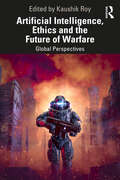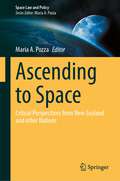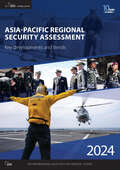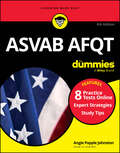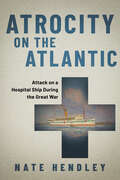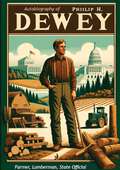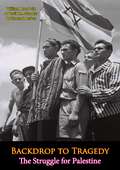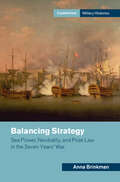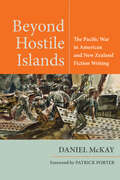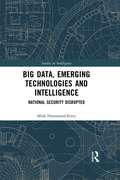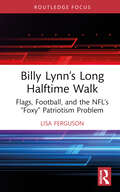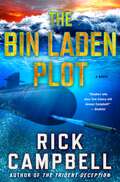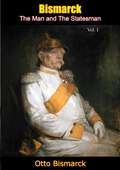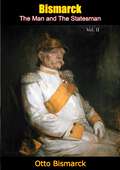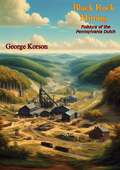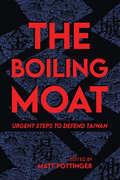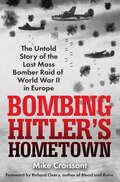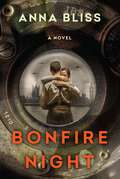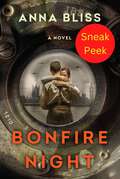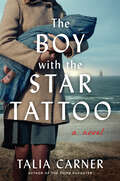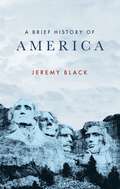- Table View
- List View
Artificial Intelligence, Ethics and the Future of Warfare: Global Perspectives
by Kaushik RoyThis volume examines how the adoption of AI technologies is likely to impact strategic and operational planning, and the possible future tactical scenarios for conventional, unconventional, cyber, space and nuclear force structures. In addition to developments in the USA, Britain, Russia and China, the volume also explores how different Asian and European countries are actively integrating AI into their military readiness. It studies the effect of AI and related technologies in training regimens and command structures. The book also covers the ethical and legal aspects of AI augmented warfare.The volume will be of great interest to scholars, students and researchers of military and strategic studies, defence studies, artificial intelligence and ethics.
Ascending to Space: Critical Perspectives from New Zealand and other Nations (Space Law and Policy)
by Maria A. PozzaThis book explores multidisciplinary perspectives on critical issues in space from the viewpoints of New Zealand and other nations. It brings together the topics examined at the Otago Foreign Policy School 2022 by both domestic and international experts in the area of space, and includes the opening address on space policy delivered by the Minister of Foreign Affairs. This book takes a multidisciplinary approach to New Zealand’s growing space sector in conjunction with other nations’ perspectives on space. It encompasses space science, military and defence matters, space tourism and astronaut rescue, and international legal and policy frameworks, while taking into account future considerations. Readers such as academics, students, policy advisers, diplomats, government officials and others engaged in the field of space will find value in this book. It will appeal to think tanks and international institutions grappling with the complexities that are presented by the outer space domain.
Asia-Pacific Regional Security Assessment 2024: Key developments and trends
The Asia-Pacific Regional Security Assessment (APRSA) examines key regional security policies and challenges relevant to the proceedings of the IISS Shangri-La Dialogue, Asia’s premier defence summit convened by the International Institute for Strategic Studies (IISS). It is published and launched at the Dialogue and the issues analysed within its covers are central to discussions at the event and beyond. This eleventh edition comes as the APRSA celebrates its first decade. A dozen IISS experts reflect on a decade of change and continuity across major security policies and challenges facing the Asia-Pacific region. Three themes materialise across six chapters: the pressure and constraints surrounding great-power competition, the enduring value of alliances and partnerships and the impact of advanced and emerging technology for regional security dynamics.In addition to the introduction, the APRSA will now feature a special-topic chapter providing a deeper analysis of an enduring security policy and challenge. The other five chapters investigate further key dimensions of the regional security environment, supported by maps, graphs, charts and tables. The six chapters of this year’s APRSA cover the following topics: Combined military exercises in the Asia-Pacific Crisis management between the United States and China India’s defence partnership in the Asia-Pacific Diplomatic approaches to managing the Myanmar conflict Disinformation campaigns in the Asia-Pacific The Asia-Pacific air-to-air challenge
ASVAB AFQT For Dummies: Book + 8 Practice Tests Online
by Angie Papple JohnstonLearn the stuff you need to know to enlist in the U.S. military Want to enlist in the military? You’ll have to pass the AFQT—the core sections of the ASVAB test that gauge your core academic competency. ASVAB AFQT For Dummies helps you review the Math Knowledge, Paragraph Comprehension, Word Knowledge, and Arithmetic Reasoning skills you’ll need to earn a great score. You’ll get access to deep content review and practice for each section, plus four full-length practice tests in the book and four more online. Plus, this book is packed with must-know information about how to register, when and where to take the test, and how to target your preferred career—including careers in the new Space Force. Study with this Dummies guide and start your U.S. military career. Review all the content covered on the four ASVAB subsections that qualify you to enlist in the U.S. armed forces Learn about each of the question types and get strategies for answering them quickly and easily Prepare with 8 full practice tests, plus more practice questions on each topic Get complete explanations of all correct answers so you can sharpen your skillsAnyone preparing to take the ASVAB will love this extra Dummies-style review and practice on the AFQT subsections.
Atrocity on the Atlantic: Attack on a Hospital Ship During the Great War
by Nate HendleyHow a German submarine sank a Canadian military hospital ship during the First World War and sparked outrage.On the evening of June 27, 1918, the Llandovery Castle — an unarmed, clearly marked hospital ship used by the Canadian military — was torpedoed off the Irish Coast by U-Boat 86, a German submarine.Sinking hospital ships violated international law. To conceal his actions, the U-86 commander had the submarine deck guns fire on survivors. One lifeboat escaped with witnesses to the atrocity. Global outrage over the attack ensued.The sinking of the Llandovery Castle was adjudicated at the Leipzig War Crimes Trials, an attempt to establish justice after hostilities ceased. The Llandovery Castle case resulted in a historic legal precedent that guided subsequent war crime prosecutions, including the Nuremberg Trials.Atrocity on the Atlantic explores the Llandovery Castle sinking, the people impacted by the attack, and the reasons why this wartime atrocity was largely forgotten.
Autobiography Of Philip H. Dewey; Farmer, Lumberman, State Official
by Philip H DeweyStep into the life of Philip H. Dewey with his compelling memoir, Autobiography of Philip H. Dewey: Farmer, Lumberman, State Official. This engaging autobiography offers a firsthand account of Dewey’s multifaceted life, providing readers with a rich tapestry of personal anecdotes, professional achievements, and historical insights.Philip H. Dewey’s life journey is a quintessential American story, reflecting the values of hard work, determination, and public service. From his early days as a farmer navigating the challenges of rural life to his ventures into the lumber industry, Dewey's narrative captures the spirit of entrepreneurship and resilience. His experiences in the lumber trade highlight the industry's significance in shaping local economies and the broader American landscape during his era.Throughout the autobiography, Dewey’s vivid storytelling brings to life the people, places, and events that shaped his journey. His narrative is enriched with historical context, offering readers a window into the socio-economic conditions and cultural milieu of his times. Dewey’s memoir is not only a personal chronicle but also a historical document that captures the evolution of American society through the lens of an individual’s experiences.Autobiography of Philip H. Dewey is an essential read for history enthusiasts, students of American studies, and anyone interested in the personal stories behind the nation’s development. Dewey’s candid and heartfelt account inspires and informs, celebrating the enduring values of hard work, dedication, and service.Join Philip H. Dewey on a journey through a life well-lived, and discover the remarkable story of a farmer, lumberman, and state official who made a lasting impact on his community and beyond. This autobiography is a testament to the power of perseverance and the enduring importance of contributing to the greater good.
Backdrop to Tragedy: The Struggle for Palestine
by William Roe Polk David M. Stamler EdmundBackdrop To Tragedy: The Struggle For Palestine by William Roe Polk is a comprehensive historical account of the conflict between Jews and Arabs over Palestine, from the early 20th century to the establishment of the State of Israel in 1948. The book delves into the complex political, social, and religious factors that shaped the conflict, including the rise of Zionism, Arab nationalism, British colonialism, and the Holocaust. Polk examines the competing claims and aspirations of both Jews and Arabs, and the various attempts at compromise and negotiation that ultimately failed. He also explores the role of external powers, such as the United States and the Soviet Union, in shaping the conflict. The book provides a detailed analysis of key events and figures, including the Balfour Declaration, the Arab Revolt, the Peel Commission, and the United Nations Partition Plan. Polk also offers insights into the personalities and motivations of key players, such as David Ben-Gurion, Haj Amin al-Husseini, and Winston Churchill. Overall, Backdrop To Tragedy is a well-researched and engaging account of one of the most enduring and contentious conflicts of the 20th century. It provides a nuanced understanding of the historical roots of the conflict, and sheds light on the ongoing struggle for peace in the region.
Balancing Strategy: Sea Power, Neutrality, and Prize Law in the Seven Years' War (Cambridge Military Histories)
by null Anna BrinkmanWhat is the relationship between seapower, law, and strategy? Anna Brinkman uses in-depth analysis of cases brought before the Court of Prize Appeal during the Seven Years' War to explore how Britain worked to shape maritime international law to its strategic advantage. Within the court, government officials and naval and legal minds came together to shape legal decisions from the perspectives of both legal philosophy and maritime strategic aims. As a result, neutrality and the negotiation of rights became critical to maritime warfare. Balancing Strategy unpicks a complex web of competing priorities: deals struck with the Dutch Republic and Spain; imperial rivalry; mercantilism; colonial trade; and the relationships between metropoles and colonies, trade, and the navy. Ultimately, influencing and shaping international law of the sea allows a nation to create the norms and rules that constrain or enable the use of seapower during war.
The Ballad of Roy Benavidez: The Life and Times of America's Most Famous Hispanic War Hero
by William SturkeyThe dramatic life of Vietnam War hero Roy Benavidez, revealing how Hispanic Americans have long shaped US history, from "a major new voice [with] lyrical powers as a biographer&” (David W. Blight, Pulitzer Prize–winning author of Frederick Douglass) In May 1968, while serving in Vietnam, Master Sergeant Roy Benavidez led the rescue of a reconnaissance team surrounded by hundreds of enemy soldiers. He saved the lives of at least eight of his comrades that day in a remarkable act of valor that left him permanently disabled. Awarded the Medal of Honor after a yearslong campaign, Benavidez became a highly sought-after public speaker, a living symbol of military heroism, and one of the country&’s most prominent Latinos. Now, historian William Sturkey tells Benavidez&’s life story in full for the first time. Growing up in Jim Crow–era Texas, Benavidez was scorned as &“Mexican&” despite his family&’s deep roots in the state. He escaped poverty by enlisting in a desegregating military and was first deployed amid the global upheavals of the 1950s. Even after receiving the Medal of Honor, Benavidez was forced to fight for disability benefits amid Reagan-era cutbacks. An unwavering patriot alternately celebrated and snubbed by the country he loved, Benavidez embodied many of the contradictions inherent in twentieth-century Latino life. The Ballad of Roy Benavidez places that experience firmly at the heart of the American story.
Bamie: Theodore Roosevelt's Remarkable Sister
by Lilian RixeyTheodore Roosevelt’s daughter Alice Roosevelt Longworth once remarked that if her “Auntie Bye” had been a man, she would have been the president.Anna Roosevelt Cowles was Theodore Roosevelt’s older sister by almost four years. She was nicknamed Bamie as a child. Her siblings, nieces, and nephews later called her “Auntie Bye” because she was always on the go.After overcoming a childhood disability, Bamie grew into a tower of strength for her immediate family and supported them throughout her life, especially after her father passed away. She also assisted her extended family at every opportunity.Throughout his life, Bamie was Theodore’s close confidante and political advisor, as well as a guiding force to other family members and friends. She was the only family member to encourage Theodore to enter politics. She planned her brother's political campaigns with Cabot Lodge and other Washington luminaries.She used her charm, perceptive judgment, and extensive contacts on both sides of the Atlantic to promote TR and his policies while and after she served as an unofficial ambassador to England.In Washington, Anna hosted regular luncheons and parties to help Theodore meet people and discuss issues with them. In fact, while he was president, Theodore was so often at his sister’s DC home that it was referred to as “the other White House”. He wrote her weekly letters, explaining he needed her help in clarifying his thoughts.Anna was a history-maker in her own right, helping to establish the US Army’s corps of nurses.Author Lillian Rixey was the grand-niece of TR’s White House physician and a journalist who was given access to unpublished material including a memoir that Bamie wrote for her son.This sparkling biography overflows with personal writings from the close-knit Roosevelt family and quotes from journalists and significant historical figures.
Beyond Hostile Islands: The Pacific War in American and New Zealand Fiction Writing (World War II: The Global, Human, and Ethical Dimension)
by Daniel McKayOffers a fascinating window into how the fraught politics of apology in the East Asian region have been figured in anglophone literary fiction.The Pacific War, 1941-1945, was fought across the world’s largest ocean and left a lasting imprint on anglophone literary history. However, studies of that imprint or of individual authors have focused on American literature without drawing connections to parallel traditions elsewhere. Beyond Hostile Islands contributes to ongoing efforts by Australasian scholars to place their national cultures in conversation with those of the United States, particularly regarding studies of the ideologies that legitimize warfare. Consecutively, the book examines five of the most significant historical and thematic areas associated with the war: island combat, economic competition, internment, imprisonment, and the atomic bombing of Hiroshima and Nagasaki.Throughout, the central issue pivots around the question of how or whether at all New Zealand fiction writing differs from that of the United States. Can a sense of islandness, the ‘tyranny of distance,’ Māori cultural heritage, or the political legacies of the nuclear-free movement provide grounds for distinctive authorial insights? As an opening gambit, Beyond Hostile Islands puts forward the term ‘ideological coproduction’ to describe how a territorially and demographically more minor national culture may accede to the essentials of a given ideology while differing in aspects that reflect historical and provincial dimensions that are important to it. Appropriately, the literary texts under examination are set in various locales, including Japan, the Solomon Islands, New Zealand, New Mexico, Ontario, and the Marshall Islands. The book concludes in a deliberately open-ended pose, with the full expectation that literary writing on the Pacific War will grow in range and richness, aided by the growth of Pacific Studies as a research area.
Beyond Summerland: The brand-new page-turning novel from the author of the breakout bestseller The Girl From the Channel Islands!
by Jenny Lecoat"From the explosive opening to the profound ending, Beyond Summerland is a wonder of storytelling. With a rich setting and secrets shimmering at the core of the narrative, Jenny Lecoat offers up everything we seek in historical fiction."--Patti Callahan Henry, New York Times bestselling author of The Secret Book of Flora LeaIn her spellbinding new novel, New York Times bestselling author Jenny Lecoat explores the secrets and lies in a small community recovering from war, and the two young women at the center of a volatile mystery.The German occupation is over. The Channel Islands, the only captured territory within the British Isles, are finally liberated. But the people of Jersey are left as scarred as the landscape. No longer a &“summerland&” holiday paradise, the island now boils with tension as locals seek revenge on anyone suspected of collaborating with the enemy during the war.Nineteen-year-old Jean Parris, still adjusting to this fractious peace, is shocked to learn that Hazel, a teacher who lives over her dad&’s shop, may be responsible for her father&’s wartime arrest. Hazel denies all accusations but has reasons to conceal what really happened.As rumors of Hazel&’s guilt swell to a fury, Jean discovers new clues that suggest there were other, more sinister factors at play. When Hazel learns of Jean&’s own ruinous secret, the women form an unexpected bond that sets them apart from the rest of Jean&’s family and the frenzied demands for retribution. But in the end, Jean&’s need to know the truth about her father may consume everything she once believed about her home, her family and herself.
Big Data, Emerging Technologies and Intelligence: National Security Disrupted (Studies in Intelligence)
by Miah Hammond-ErreyThis book sets out the big data landscape, comprising data abundance, digital connectivity and ubiquitous technology, and shows how the big data landscape and the emerging technologies it fuels are impacting national security.This book illustrates that big data is transforming intelligence production as well as changing the national security environment broadly, including what is considered a part of national security as well as the relationships agencies have with the public. The book highlights the impact of big data on intelligence production and national security from the perspective of Australian national security leaders and practitioners, and the research is based on empirical data collection, with insights from nearly 50 participants from within Australia’s National Intelligence Community. It argues that big data is transforming intelligence and national security and shows that the impacts of big data on the knowledge, activities and organisation of intelligence agencies is challenging some foundational intelligence principles, including the distinction between foreign and domestic intelligence collection. Furthermore, the book argues that big data has created emerging threats to national security; for example, it enables invasive targeting and surveillance, drives information warfare as well as social and political interference, and challenges the existing models of harm assessment used in national security. The book maps broad areas of change for intelligence agencies in the national security context and what they mean for intelligence communities, and explores how intelligence agencies look out to the rest of society, considering specific impacts relating to privacy, ethics and trust.This book will be of much interest to students of intelligence studies, technology studies, national security and International Relations.
Billy Lynn’s Long Halftime Walk: Flags, Football, and the NFL’s “Foxy” Patriotism Problem (Routledge Focus on Literature)
by Lisa FergusonThis book examines how the game of football and militarism have historically overlapped due to their shared celebration of strength, might, and besting a clear and definitive foe. Nevertheless, since September 11, a variety of staged patriotic vignettes dominated most NFL broadcasts, giving the once easy and unforced union a stilted feel. That the War on Terror became a fixture of modern- day Super Bowls was easy to portend; what was more difficult to predict was the imprint it would leave on U.S. citizens and American politics. Ben Fountain’s award- winning novel, Billy Lynn’s Long Halftime Walk, reveals what passes for patriotism in a country that has reduced the sober and stark reality of combat to pageantry and production for the crowd back home, leaving our troops to unwittingly play the part of entertainers, destined to be sexualized just like the cheerleaders and dancers so frequently performing alongside them.
The Bin Laden Plot: A Novel (Trident Deception Series #7)
by Rick CampbellA U.S. destroyer is torpedoed by an Iranian submarine and Captain Murray Wilson of the U.S.S. Michigan is flown to the Pentagon to meet with the Secretary of the Navy (SecNav). There Wilson learns that the Iranian submarine is just a cover story. One of the United States' own fully automated unmanned underwater vehicles has gone rogue, its programming corrupted in some way. Murray is charged with hunting it down and taking it out before the virus that's infected its operating system can infect the rest of the fleet. At the same time, the head of the SEAL detachment aboard the U.S.S Michigan is killed and Lonnie Mixell, a former U.S. operative, now assassin for hire, is responsible. And that is only the first SEAL to be hunted down and killed. Jake Harrison, fellow SEAL, discovers that these SEALs had one mission in common - they were all on the team that killed Bin Laden. Or so the world was told. As Wilson discovers that his mission is actually meant to cover up dangerous acts of corruption, even treason, Harrison discovers that the assassin is out to protect the same forces. Forces too powerful for either of them to take on alone.
Bismarck: The Man and The Statesman Vol. I (Bismarck: The Man and The Statesman #1)
by Otto Bismarck"Politics is the art of the possible," Otto Von Bismarck famously said, and here, in his own words, the art of politics is laid bare by one of the most prominent and influential European statesmen of the nineteenth century. These are the intimate reflections and reminiscences of the man who unified the independent Germanic states into one nation, and whose subsequent promotion of the new country's colonial ambitions earned him the title of the founder of the German empire. This first volume of what must be considered an essential historical document details Bismarck's early life, from the political views of his youth and his entrance into public life through his work in government ministries and his time at the Court of Munich. It is vital reading for any informed, in-depth understanding of modern European history.-Print ed.
Bismarck, The Man and The Statesman Vol. II (Bismarck: The Man and The Statesman #2)
by Otto Bismarck"Politics is the art of the possible," Otto Von Bismarck famously said, and here, in his own words, the art of politics is laid bare by one of the most prominent and influential European statesmen of the nineteenth century. These are the intimate reflections and reminiscences of the man who unified the independent Germanic states into one nation, and whose subsequent promotion of the new country's colonial ambitions earned him the title of the founder of the German empire. This first volume of what must be considered an essential historical document details Bismarck's early life, from the political views of his youth and his entrance into public life through his work in government ministries and his time at the Court of Munich. It is vital reading for any informed, in-depth understanding of modern European history.-Print ed.
Black Rock Mining: Folklore of the Pennsylvania Dutch
by George KorsonDiscover the rich cultural heritage and vibrant folklore of the Pennsylvania Dutch miners with George Korson's Black Rock: Mining Folklore of the Pennsylvania Dutch. This captivating book offers an in-depth look into the lives, traditions, and stories of the Pennsylvania Dutch communities that thrived in the coal mining regions of Pennsylvania.Korson, a renowned folklorist and historian, delves into the unique blend of cultural influences that shaped the folklore of these hardworking communities. Through a collection of tales, songs, and personal anecdotes, Black Rock paints a vivid picture of the miners' daily lives, their beliefs, and their enduring spirit in the face of danger and hardship.The book explores a variety of themes, from supernatural legends and ghost stories to humorous anecdotes and practical jokes. Korson's meticulous research and engaging storytelling bring to life the rich oral traditions that were passed down through generations, offering readers a window into the communal values and resilience of the Pennsylvania Dutch miners.Black Rock is more than just a collection of folklore; it is a celebration of the human spirit and the cultural tapestry that defined the mining communities. Korson's work provides valuable insights into the social and economic conditions of the time, highlighting the role of folklore in providing solace, entertainment, and a sense of identity.This book is an essential read for anyone interested in folklore, cultural history, or the mining heritage of Pennsylvania. Whether you are a scholar, a history enthusiast, or simply curious about the traditions of the Pennsylvania Dutch, Black Rock: Mining Folklore of the Pennsylvania Dutch offers a fascinating and enriching experience.Join George Korson on a journey through the coal mines of Pennsylvania and immerse yourself in the captivating folklore of a resilient and storied community.
The Boiling Moat: Urgent Steps to Defend Taiwan
by Matt PottingerChinese leader Xi Jinping has openly expressed his intention to annex Taiwan to mainland China, even threatening the use of force. An invasion or blockade of Taiwan by Chinese forces would be catastrophic, with severe consequences for democracies worldwide. In The Boiling Moat, Matt Pottinger and a team of scholars and distinguished military and political leaders urgently outline practical steps for deterrence. The authors stress that preventing a war is more affordable than waging one and emphasize the importance of learning from recent failures in deterrence, such as Russia's invasion of Ukraine.The book argues that a robust military strategy is essential for countering Beijing's aggression. Pottinger and his team map out a workable military strategy for Taiwan, the United States, Japan, Australia, and Europe to pursue collectively, urging quick adoption to avert a devastating war. The significance of Taiwan to the world economy, semiconductor supply, and Indo-Pacific security is underscored.The authors stress that preventing China's coercive annexation of Taiwan requires democracies to demonstrate not just the means but also the will to effectively resist, conveying the message that a military attempt by Xi would likely lead to disastrous consequences, both for China and for the international community.
Bombing Hitler's Hometown: The Untold Story of the Last Mass Bomber Raid of World War II in Europe
by Mike CroissantOne of WWII&’s final untold stories, this visceral account of the white-knuckled bombing mission American airmen carried out on Hitler&’s hometown of Linz, Austria is now told for the first time through the eyes of the men on the airplanes as well as the innocent Austrians under the bombs. Fans of Masters of the Air and Unbroken will be riveted by this groundbreaking true story of the aerial bombing and its aftermath from retired CIA officer Mike Croissant. Foreword by Richard Overy, author of The Bombers and the Bombed In April 1945, Linz was one of Nazi Germany&’s most vital assets. It was a crucial transportation hub and communications center, with railyards brimming with war materiel destined for the front lines. Linz was also the town Hitler claimed as home and had long intended to remake as the cultural capital of Europe, filling its planned Fuehrermuseum with world-famous art stolen from his conquered territories. Inevitably, Linz was also one of the most heavily defended targets remaining in Europe. The airmen of the Fifteenth Air Force were a mix of seasoned veterans and newcomers. As their mission was unveiled in the predawn hours of April 25th, audible groans and muffled expletives passed many lips. The reality of that mission would prove more brutal than any imagined. In the unheated, unpressurized B‑24 Liberator and B‑17 Flying Fortress heavy bombers, young men battled elements as dangerous as anything the Germans could throw at them. When batteries of German anti‑aircraft guns opened fire, the men flew into a man‑made hell of exploding shrapnel. Aircraft and men fell from the sky as Austrian civilians on the ground also struggled to survive beneath the bombs during the deadly climax of Hitler&’s war. Drawing on interviews with dozens of America&’s last surviving World War II veterans, as well as previously unpublished sources, Mike Croissant compellingly relates one of the war&’s last truly untold stories—a gripping chronicle of warfare, the death of Nazi Germany, and the beginning of the Cold War. It is also a timeless tale of courage and terror, loss and redemption, humanity and savagery.
Bonfire Night: A Gripping And Emotional Ww2 Novel Of Star Crossed Love
by Anna Bliss&“A most tender work of art...Bonfire Night is a treasure of a novel, beautifully written with the unflinching style and subtle psychological insights of such masters as Ian McEwan and Graham Swift.&” –Natalie Jenner, internationally bestselling author of The Jane Austen Society and Bloomsbury GirlsSpanning from England's anti-fascism protests of 1936 through the aftermath of WWII, this moving, intricately wrought historical novel brings together a young Irish Catholic photographer and a British Jewish medical student, each discovering the price of love, art, and ambition…London, 1936: At twenty-one, Kate Grifferty is a press photographer in a Fleet Street agency, an unusual job for a young woman. But Kate is both talented and daring, recklessly going wherever the story might be—including, one October day, to an anti-fascism protest in East London. There, she meets David Rabatkin, a brilliant Jewish medical student. While his idealistic brother is eager to go to Spain and join the fight for the Republic, David knows where his path lies: at home, fulfilling the expectations of his profession and his family. Kate is exposed for the first time to the dangers and demands of David&’s world, where marrying within the Jewish faith is seen as not only preferable, but key to survival. Kate neither expects nor wants to be any man&’s wife, hampered by convention. And though she and David are both outsiders, as war looms, other differences between them are thrown into sharp relief.Brighton, 1940: Catastrophe forces Kate to flee London and the onslaught of war finds her working at her sister&’s seaside boarding house, while David tends patients at a busy London hospital as the Blitz rages. But Kate&’s challenges and disappointments have only deepened her desire to capture images of life unfurling around her, the beauty and violence, struggles and surprising joys. And soon fate and ambition will align, providing her with the chance to make her mark at last . . .
Bonfire Night: Sneak Peek
by Anna BlissBe one of the first to read this sneak preview sample edition before the full length novel comes out!&“A a most tender work of art...Bonfire Night is a treasure of a novel, beautifully written with the unflinching style and subtle psychological insights of such masters as Ian McEwan and Graham Swift.&” —Natalie Jenner, internationally bestselling author of The Jane Austen Society and Bloomsbury GirlsSpanning from England's anti-fascism protests of 1936 through the aftermath of WWII, this moving, intricately wrought historical novel brings together a young Irish Catholic photographer and a British Jewish medical student, each discovering the price of love, art, and ambition…London, 1936: At twenty-one, Kate Grifferty is a press photographer in a Fleet Street agency, an unusual job for a young woman. But Kate is both talented and daring, recklessly going wherever the story might be—including, one October day, to an anti-fascism protest in East London. There, she meets David Rabatkin, a brilliant Jewish medical student. While his idealistic brother is eager to go to Spain and join the fight for the Republic, David knows where his path lies: at home, fulfilling the expectations of his profession and his family.Kate is exposed for the first time to the dangers and demands of David&’s world, where marrying within the Jewish faith is seen as not only preferable, but key to survival. Kate neither expects nor wants to be any man&’s wife, hampered by convention. And though she and David are both outsiders, as war looms, other differences between them are thrown into sharp relief.Brighton, 1940: Catastrophe forces Kate to flee London and the onslaught of war finds her working at her sister&’s seaside boarding house, while David tends patients at a busy London hospital as the Blitz rages. But Kate&’s challenges and disappointments have only deepened her desire to capture images of life unfurling around her, the beauty and violence, struggles and surprising joys. And soon fate and ambition will align, providing her with the chance to make her mark at last . . .
The Boy with the Star Tattoo: A Novel
by Talia CarnerFrom acclaimed author of The Third Daughter comes an epic historical novel of ingenuity and courage, of love and loss, spanning postwar France when Israeli agents roamed the countryside to rescue hidden Jewish orphans—to the 1969 daring escape of the Israeli boats of Cherbourg.1942: As the Vichy government hunts for Jews across France, Claudette Pelletier, a young and talented seamstress and lover of romance novels, falls in love with a Jewish man who seeks shelter at the château where she works. Their whirlwind and desperate romance before he must flee leaves her pregnant and terrified.When the Nazis invade the Free Zone shortly after the birth of her child, the disabled Claudette is forced to make a heartbreaking choice and escapes to Spain, leaving her baby in the care of his nursemaid. By the time Claudette is able to return years later, her son has disappeared. Unbeknown to his anguished mother, the boy has been rescued by a Youth Aliyah agent searching for Jewish orphans.1968: When Israeli naval officer Daniel Yarden recruits Sharon Bloomenthal for a secret naval operation in Cherbourg, France, he can’t imagine that he is the target of the agenda of the twenty-year-old grieving the recent loss of her fiancé in a drowned submarine. Sharon suspects that Danny's past in Youth Aliyah may reflect that of her mysterious late mother and she sets out to track her boss’s extraordinary journey as an orphan in a quaint French village all the way to Israel.As Danny focuses on the future of his people and on executing a daring, crucial operation under France’s radar, he is unaware that the obsessed Sharon follows the breadcrumbs of clues across the country to find her answers. But she is wholly unprepared for the dilemma she must face upon solving the puzzle.
A Brief History of America (Brief Histories)
by Jeremy BlackThe next in this series of admirably concise yet nevertheless comprehensive titles looks at the history of all Americans as well as America; its environmental history and its linkage to economic history; the political shaping of America; and America in the world, from being a colony to post-Cold War America.Black examines the environmental history of America and its linkage to economic history, crucially, the clearing of forests; the spread of agriculture; mineral, coal and iron extraction; industrialisation; urbanisation; and current and growing climate-crisis concerns.He explores the political shaping of America: indigenous American polities; free European and unfree African settlements; the creation of an American State, and its successes and failures from 1783 to 1861; Civil War; democratisation; the rise of the federal Government from the 1930s; the Civil Rights movement from the 1950s onwards, and tensions in more recent governance. The book considers America in the World: as a pre-colonial and colonised space; as a newly-independent power, then a rising international one, the Cold War and the USA as the sole superpower in the post-Cold-War world. These key themes are tackled chronologically for the sake of clarity, beginning with the geological creation of North America, human settlement and native American cultures to 1500; the arrival of Europeans and enslaved Africans to 1770 - the Spanish and French in the Gulf of Mexico and Florida, the English and French, and the Dutch and Swedes further north.The focus then shifts to settler conflicts with native Americans and between European powers leading to a British-dominated North America by 1770. Then the end of European rule and the foundation of an American trans-continental state. The section dealing with the years from 1848 to 1880 looks at the Civil War between North and South, reconstruction and the creation of a new society.Between 1880 and 1920, the United States became an industrial powerhouse and an international power, also a colonial power - the Philippines, Hawaii, Puerto Rico - and a participant in the First World War.The interwar years, 1921 to 1945, brought turmoil: the Roaring Twenties; the growth of Hollywood; Prohibition; jazz; the Great Depression and the New Deal; finally the Second World War. 1945 to 1968 was the American Age, brimming with confidence and success as the world's leading power, but also the ongoing struggle for civil rights. Subsequent years to 1992 brought crisis and recovery: Watergate, the Reagan years and the USA as the sole world superpower.In bringing the book right up to the present day, Black looks at factors that divide American society and economy, though it remains a country of tremendous energy.
A Brief History of America (Brief Histories)
by Jeremy BlackThe next in this series of admirably concise yet nevertheless comprehensive titles looks at the history of all Americans as well as America; its environmental history and its linkage to economic history; the political shaping of America; and America in the world, from being a colony to post-Cold War America.Black examines the environmental history of America and its linkage to economic history, crucially, the clearing of forests; the spread of agriculture; mineral, coal and iron extraction; industrialisation; urbanisation; and current and growing climate-crisis concerns.He explores the political shaping of America: indigenous American polities; free European and unfree African settlements; the creation of an American State, and its successes and failures from 1783 to 1861; Civil War; democratisation; the rise of the federal Government from the 1930s; the Civil Rights movement from the 1950s onwards, and tensions in more recent governance. The book considers America in the World: as a pre-colonial and colonised space; as a newly-independent power, then a rising international one, the Cold War and the USA as the sole superpower in the post-Cold-War world. These key themes are tackled chronologically for the sake of clarity, beginning with the geological creation of North America, human settlement and native American cultures to 1500; the arrival of Europeans and enslaved Africans to 1770 - the Spanish and French in the Gulf of Mexico and Florida, the English and French, and the Dutch and Swedes further north.The focus then shifts to settler conflicts with native Americans and between European powers leading to a British-dominated North America by 1770. Then the end of European rule and the foundation of an American trans-continental state. The section dealing with the years from 1848 to 1880 looks at the Civil War between North and South, reconstruction and the creation of a new society.Between 1880 and 1920, the United States became an industrial powerhouse and an international power, also a colonial power - the Philippines, Hawaii, Puerto Rico - and a participant in the First World War.The interwar years, 1921 to 1945, brought turmoil: the Roaring Twenties; the growth of Hollywood; Prohibition; jazz; the Great Depression and the New Deal; finally the Second World War. 1945 to 1968 was the American Age, brimming with confidence and success as the world's leading power, but also the ongoing struggle for civil rights. Subsequent years to 1992 brought crisis and recovery: Watergate, the Reagan years and the USA as the sole world superpower.In bringing the book right up to the present day, Black looks at factors that divide American society and economy, though it remains a country of tremendous energy.
